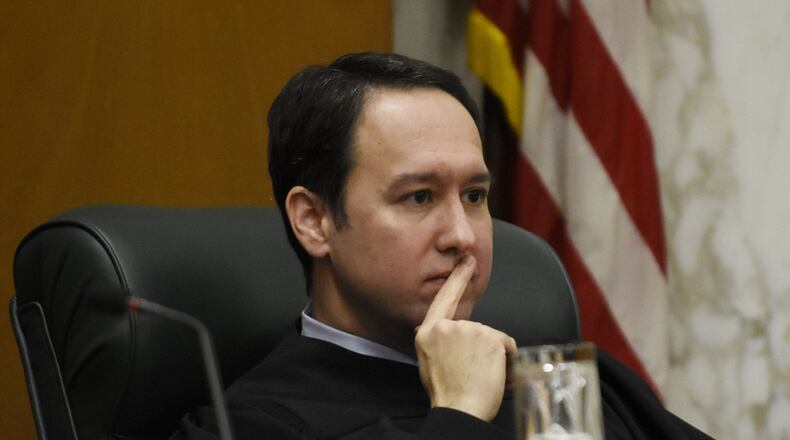Earlier this summer, the Georgia Supreme Court issued a sweeping, unanimous opinion that the state is immune from lawsuits, a precedent that brought cries of tyranny from the left and right.
The Georgia justices pinned their analysis to a centuries-old tradition in English law called "sovereign immunity" — a legal theory that the king (or, in our case, Gov. Nathan Deal and the General Assembly) is legally infallible and protected from lawsuits. The ruling means state lawmakers can pass whatever harebrained — or even dangerous — law they can dream up and you cannot take the state to court to challenge whether it violates protections in the Georgia Constitution.
That's a problem for people who worry about the unchecked power of government. But Justice Keith Blackwell, who authored the 71-page opinion/history term paper justifying the decision, wrote he was going back to the original intent of the framers of Georgia's state constitution.
But which framers are we talking about?
Athens attorney Stephen Humphreys, whose clients have regularly sued the state, believes the opinion is flawed because it relies on an outdated version of the state’s governing document — the Georgia Constitution of 1861.
If that year sounds familiar, it’s because that’s when Georgia joined with 10 other states in attempting to secede from the United States. That means, Humphreys said, the Georgia justices are relying on Confederate-era law, and unless I misread the final score, that side lost the Civil War.
To understand what Humphreys is talking about, it’s important to know that Blackwell’s opinion rests on both the English common law concept of sovereign immunity and the more American idea of “judicial review,” which says that courts have the authority to rule on whether laws violate the Constitution.
Judicial review was established at the federal level in 1803 by the U.S. Supreme Court, but doesn’t appear in Georgia law for another 58 years. The 1861 state constitution says laws passed “in violation of the fundamental law are void; and the Judiciary shall so declare them.”
So, judges can rule on the constitutionality of state law. But, Blackwell wrote, “We find no indication that this constitutional reference to judicial review would have been understood in 1861 to imply a right of action against anyone, much less a right of action against the state.” Blackwell said the state can waive its immunity, but legislators must do that for each individual law.
That’s originalism: If the Boys in Gray didn’t foresee a right to sue the state, then we don’t.
Humphreys said it legal hogwash. It’s an attempt to use a circuitous route through legal history to arrive where the justices wanted to be all along.
Georgia has a statute on the books allowing courts to make declaratory judgments on the law and the current state constitution gives the Supreme Court the specific role to rule on whether state laws violate it, he said.
“To get to a different result, the 2017 justices have to wander through the royal court of King George III and the Confederate legislature,” he said. “Seems like a strange journey to avoid the law written down on the books today.”
It’s also dangerous and confusing, he said.
“It’s just a veil for corruption in Georgia,” he said. “It’s opening cans of craziness across the state.”
Emphasis on original intent
John Amabile at the Atlanta firm of Parker Poe said the Confederate argument is interesting but unlikely to impress the Georgia court. With this decision, the court has staked out a “textualist” position, meaning the justices simply are going to rely on the words on the page when reading the law. And they are doing that by going back to the original point those words were put to paper, he said.
“I think what the texturalist response is, they go back to the first time the words are used,” he said. “Even if it wasn’t a legal document in 1861, that puts in context the use of those same words the first time Georgia amended its Constitution after the Civil War.”
In fact, the same clause on judicial review was put in the 1865 state constitution and again in 1868, each time with some refinements. In a footnote in his opinion, Blackwell wrote that each subsequent rewrite has carried the clause in “virtually identical language.”
Amabile described himself as an “agnostic” when it comes to this way of interpreting the law, but he said he would think Blackwell probably cares less that the inspiration for judicial review came during the Civil War, than what was the original intent. That’s clear, since he also refers to the 18th century writings of English judge Sir William Blackstone to gird his argument on sovereign immunity.
“Obviously that is not going to be a binding document in American law,” Amabile said.
Amabile said the opinion is an important signpost for attorneys looking to challenge state laws that this court is going to take a literal and historical approach to such arguments.
He also said it is important that Blackwell left open some ways around sovereign immunity. In his opinion, Blackwell said Georgians can sue government officials, but only in their “individual capacities” and in cases where the real target isn’t the state.
That’s tricky. For instance, what happens when a suit is filed against an official and that official leaves office? Does the suit follow that person or does it attach itself to his or her successor? That’s a question the court may answer later, Blackwell wrote.
Humphreys has some clients with gripes against the state and said he looks forward to challenging the ruling. In the meantime, this is an opinion that bears watching.
About the Author
Keep Reading
The Latest
Featured







